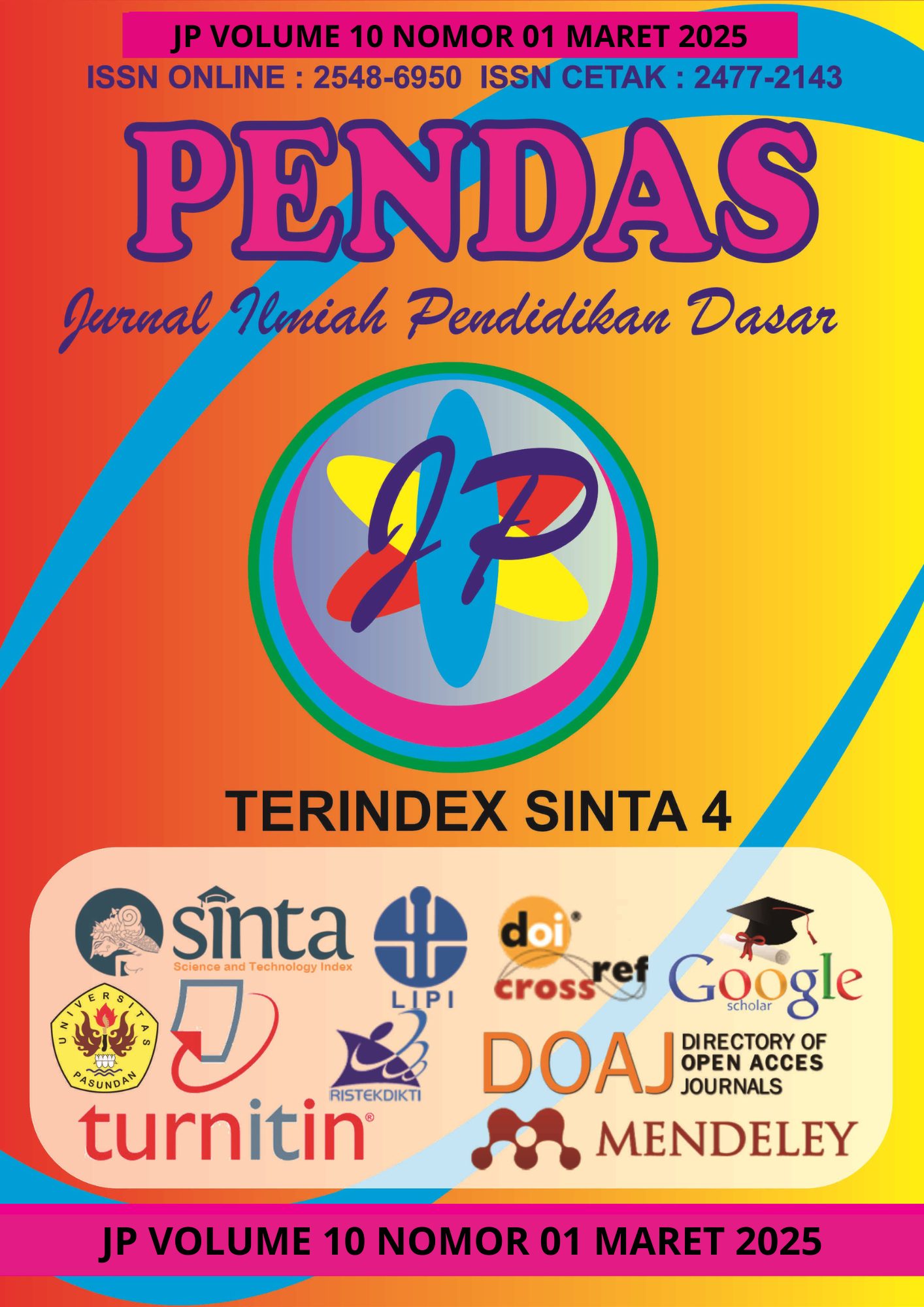PERSPEKTIF PENDIDIKAN DAN PELATIHAN DALAM MENINGKATKAN KUALITAS GURU MADRASAH (Studi Kasus Kualitatif pada Program Peningkatan Kualitas Guru Madrasah di MTs N 1 Bandung)
DOI:
https://doi.org/10.23969/jp.v10i01.22138Keywords:
Pendidikan dan Pelatihan, Guru Madrasah, Kompetensi Guru, Evaluasi Pelatihan, Pendekatan Berbasis Kebutuhan, MTsN 1 BandungAbstract
Penelitian ini bertujuan untuk menganalisis perencanaan, pengorganisasian, pelaksanaan, serta evaluasi dan pemantauan program pendidikan dan pelatihan dalam meningkatkan kualitas guru Madrasah di MTsN 1 Bandung. Menggunakan pendekatan kualitatif dengan metode studi kasus, penelitian ini menggali efektivitas program melalui wawancara mendalam, observasi langsung, dan analisis dokumen. Hasil penelitian menunjukkan bahwa perencanaan dilakukan secara sistematis dan berbasis kebutuhan dengan melibatkan berbagai pihak untuk memastikan relevansi kurikulum pelatihan. Pengorganisasian yang baik ditunjukkan melalui pembagian tugas yang jelas, penggunaan teknologi digital untuk komunikasi, serta pengelompokan peserta berdasarkan kompetensi awal. Pelaksanaan program menggunakan metode beragam seperti simulasi, diskusi kelompok, dan pembelajaran berbasis proyek, yang didukung oleh pendekatan hybrid untuk meningkatkan fleksibilitas waktu. Evaluasi dan pemantauan dilakukan secara berkelanjutan dengan memanfaatkan teknologi digital, memberikan umpan balik real-time, dan melibatkan kepala Madrasah sebagai fasilitator. Penelitian ini menegaskan pentingnya pendekatan holistik, berbasis data, dan berorientasi pada kebutuhan lokal dalam meningkatkan kualitas guru Madrasah.
Kata Kunci: Pendidikan dan Pelatihan, Guru Madrasah, Kompetensi Guru, Evaluasi Pelatihan, Pendekatan Berbasis Kebutuhan, MTsN 1 Bandung
Downloads
References
Alhumaid, K., Shahi, M., & Alharbi, A. (2022). Leveraging technology in teacher training programs: Perspectives from educational leaders. Educational Technology Research and Development, 70(4), 965–983. https://doi.org/10.1007/s11423-021-10058-9
Ali, S., Ahmad, N., & Khan, M. (2023). Integration of technology in teacher training programs: Challenges and opportunities. Educational Technology Research and Development, 71(1), 45–62. https://doi.org/10.1007/s11423-022-10158-0
Alsubaie, M. A. (2021). Needs assessment in educational planning: Theoretical and practical perspectives. International Journal of Educational Research, 105, 101720. https://doi.org/10.1016/j.ijer.2021.101720
American Educational Research Association. (2011). Code of ethics. AERA.
Black, P., & Wiliam, D. (2018). Assessment and classroom learning. Assessment in Education: Principles, Policy & Practice, 25(6), 541–564. https://doi.org/10.1080/0969594X.2018.1465322
Bowen, G. A. (2009). Document analysis as a qualitative research method. Qualitative Research Journal, 9(2), 27–40.
Braun, V., & Clarke, V. (2006). Using thematic analysis in psychology. Qualitative Research in Psychology, 3(2), 77–101.
Bush, T. (2021). Leadership and management in education: International perspectives and practices. Educational Management Administration & Leadership, 49(1), 5–20. https://doi.org/10.1177/1741143220929176
Creswell, J. W., & Creswell, J. D. (2021). Research design: Qualitative, quantitative, and mixed methods approaches. Sage publications.
Darling-Hammond, L., Hyler, M. E., & Gardner, M. (2022). Effective teacher professional development: New evidence and best practices. Teaching and Teacher Education, 117, 103737. https://doi.org/10.1016/j.tate.2022.103737
Dewey, J. (1938). Experience and Education. Macmillan.
Fixsen, D. L., Blase, K. A., & Naoom, S. F. (2021). Implementation science in education: Best practices and strategies for success. Routledge.
Freeman, S., Eddy, S. L., & McDonough, M. (2020). Active learning increases student performance in STEM disciplines. Proceedings of the National Academy of Sciences, 117(1), 289-293. https://doi.org/10.1073/pnas.2011247117
Gulati, R., Casto, C., & Krontiris, C. (2021). Collaborative leadership in action: Lessons from education reforms. Journal of Educational Leadership and Policy, 15(2), 120–135. https://doi.org/10.1177/1741143221002314
Huda, M., et al. (2023). "Implementasi Teknologi dalam Pendidikan Guru Madrasah."
International Journal of Educational Development, 54, 1-15.
Kementerian Agama RI. (2023). Laporan Tahunan Pendidikan Madrasah. Kemenag.
Khan, I., Rahman, A., & Ahmed, M. (2022). Sustaining teacher professional development through continuous feedback: An empirical study. Journal of Educational Change, 23(3), 337–355. https://doi.org/10.1007/s10833-022-09487-9
Khan, S., Riaz, M., & Ahmed, T. (2023). Challenges in implementing teacher training programs in resource-limited settings. International Journal of Educational Development, 55(1), 30-45. https://doi.org/10.1016/j.ijedudev.2023.102489
Khan, Z., & Riaz, M. (2023). Sustaining educational initiatives: Challenges in the organization of teacher training programs. International Journal of Educational Development, 55(1), 45–57. https://doi.org/10.1016/j.ijedudev.2022.102501
Kirkpatrick, D. L. (2006). Evaluating Training Programs: The Four Levels. Berrett-Koehler Publishers.
Kirkpatrick, D. L., & Kirkpatrick, J. D. (2020). Evaluating training programs: The four levels.
Berrett-Koehler Publishers.
Knowles, M. S. (1984). The Adult Learner: A Neglected Species. Gulf Publishing.
Leithwood, K., Harris, A., & Hopkins, D. (2021). Seven strong claims about successful school leadership revisited. School Leadership & Management, 41(1–2), 5–29. https://doi.org/10.1080/13632434.2021.1949814
Leithwood, K., Sun, J., & Pollock, K. (2021). Leadership development for effective schools: Evidence-based practices. Springer.
Lincoln, Y. S., & Guba, E. G. (1985). Naturalistic inquiry. Sage.
Liu, Y., Wang, H., & Lin, C. (2020). Applying constructivist learning theory to improve teacher training programs. Asia-Pacific Journal of Teacher Education, 48(5), 413–428. https://doi.org/10.1080/1359866X.2020.1746781
Mintzberg, H. (2020). Organizational structures and management strategies. New York: Free Press.
Patton, M. Q. (2015). Qualitative research and evaluation methods. Sage.
Rao, S., & Valsaraj, A. (2022). Collaborative learning in teacher education: A social constructivist perspective. International Journal of Learning, Teaching and Educational Research, 21(8), 99–115. https://doi.org/10.26803/ijlter.21.8.7
Rubin, H. J., & Rubin, I. S. (2012). Qualitative interviewing: The art of hearing data. Sage.
Salas, E., Tannenbaum, S. I., & Kraiger, K. (2022). Advancing training effectiveness in the digital age. Journal of Applied Psychology, 107(3), 409–427. https://doi.org/10.1037/apl0001008
Salas, E., Tannenbaum, S. I., & Kraiger, K. (2022). Advancing training effectiveness in the digital age. Journal of Applied Psychology, 107(3), 409–427. https://doi.org/10.1037/apl0001008
Salas, E., Tannenbaum, S. I., Kraiger, K., & Smith-Jentsch, K. A. (2022). The science of training and development in organizations: What matters in practice. Annual Review of Organizational Psychology and Organizational Behavior, 9, 149–178. https://doi.org/10.1146/annurev-orgpsych-012320-083834
Sharma, R., Gupta, N., & Mehta, K. (2020). Data-driven educational planning: Best practices and lessons learned. Education and Information Technologies, 25(4), 2965–2985. https://doi.org/10.1007/s10639-020-10102-4
Tomlinson, C. A. (2020). Differentiated instruction: Meeting the needs of all learners. Theory Into Practice, 59(3), 174–183. https://doi.org/10.1080/00405841.2020.1756237
Wahyuni, S. (2022). "Analisis Tantangan Guru Madrasah di Daerah Terpencil." Jurnal Pendidikan Islam, 10(2), 45-60.
Wang, J., & Nguyen, T. (2020). Application of Herzberg’s theory in educational settings: A systematic review. Journal of Educational Psychology, 112(5), 876–890. https://doi.org/10.1037/edu0000457
Yin, R. K. (2018). Case study research and applications: Design and methods. Sage.
Downloads
Published
Issue
Section
License
Copyright (c) 2025 Pendas : Jurnal Ilmiah Pendidikan Dasar

This work is licensed under a Creative Commons Attribution 4.0 International License.














































